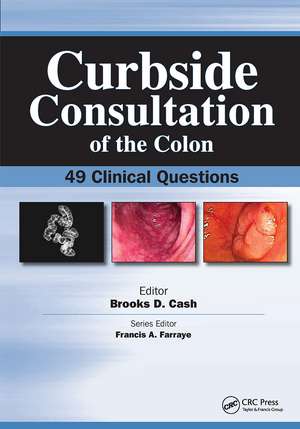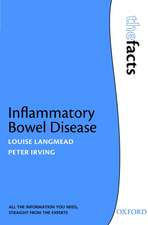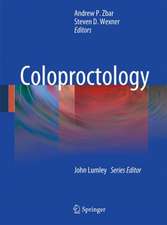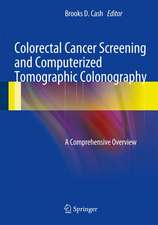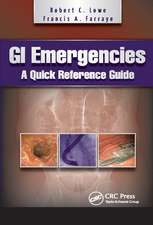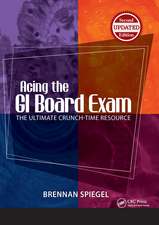Curbside Consultation of the Colon: 49 Clinical Questions: Curbside Consultation in Gastroenterology
Editat de Brookes Cashen Limba Engleză Paperback – 15 sep 2008
Dr. Brooks D. Cash has designed this unique reference, which offers expert advice, preferences, and opinions on tough clinical questions commonly associated with the colon. The unique Q&A format provides quick access to current information related to the colon with the simplicity of a conversation between two colleagues. Numerous images, diagrams, and references are included to enhance the text and to illustrate the treatment of the colon.
Curbside Consultation of the Colon: 49 Clinical Questions provides information basic enough for residents while also incorporating expert advice that even high-volume clinicians will appreciate. Gastroenterologists, fellows and residents in training, surgical attendings, and surgical residents will benefit from the user-friendly and casual format and the expert advice contained within.
Some of the questions that are answered:
- What is the appropriate evaluation for fecal incontinence?
- What colonic infections are associated with AIDS?
- What are the current colorectal cancer screening and surveillance recommendations?
- What is the best way to manage chronic constipation?
- Where do probiotics fit into the management of IBS?
- How should diverticulitis be managed?
- What is colonic pseudo-obstruction and how is it managed?
Preț: 847.07 lei
Preț vechi: 891.65 lei
-5% Nou
Puncte Express: 1271
Preț estimativ în valută:
162.08€ • 169.23$ • 134.15£
162.08€ • 169.23$ • 134.15£
Carte tipărită la comandă
Livrare economică 04-18 aprilie
Preluare comenzi: 021 569.72.76
Specificații
ISBN-13: 9781556428319
ISBN-10: 1556428316
Pagini: 214
Dimensiuni: 178 x 254 x 13 mm
Greutate: 0.54 kg
Ediția:First.
Editura: CRC Press
Colecția CRC Press
Seria Curbside Consultation in Gastroenterology
ISBN-10: 1556428316
Pagini: 214
Dimensiuni: 178 x 254 x 13 mm
Greutate: 0.54 kg
Ediția:First.
Editura: CRC Press
Colecția CRC Press
Seria Curbside Consultation in Gastroenterology
Public țintă
Professional Practice & DevelopmentCuprins
CONTENTS Dedication Acknowledgments About the Editor Contributing Authors Preface Foreword by Carol Burke, MD Introduction Section I: COLON CANCER SCREENING Question 1 A 46-Year-Old African American Man Who Has No Alarm Features or Symptoms Requests a Screening Colonoscopy. Is This Appropriate? Jason Taylor, MD; and Philip Schoenfeld, MD, MSEd, MSc (Epi) Question 2 What Pathologic Analysis Do I Need to Pursue in a 38-Year-Old Man With Cecal Cancer Whose Family History Is Suspicious for Hereditary Nonpolyposis Colon Cancer? B. Joe Elmunzer, MD; and Philip Schoenfeld, MD, MSEd, MSc (Epi) Question 3 How Do You Respond to Patients Wanting to Take Aspirin, Calcium, or Other Medications as Prophylaxis for Colorectal Cancer? Is There Any Evidence That They Work? Amit Singal, MD, and Philip Schoenfeld, MD, MSEd, MSc (Epi) Question 4 My Patient Had a 3-cm, Sessile Tubulovillous Adenoma on the Sigmoid That I Removed Piecemeal. The Pathology Lab Can't Verify Clear Margin. What Should I Recommend to the Patient? Brennan Spiegel, MD, MSHS, and Inder Singh, MD Question 5 The Board of Directors of My Hospital Wants to Know the Current Colorectal Cancer Screening Options and Will Go With Whatever I Recommend. What Does the Evidence Say Is the Best Colorectal Cancer Screening Regimen? Brennan Spiegel, MD, MSHS, and Inder Singh, MD Question 6 My Patient Had a 13-mm Tubular Adenoma Removed From Her Colon. What Kind of Surveillance Do I Need To Recommend? Would It Change Things if She Were 80 Years Old Without Co-Morbidities? Brooks D. Cash, MD, FACP, FACG Question 7 I Have a Patient Whose Brother, Mother, and Maternal Uncle All Had Colon Cancer Diagnosed Before the Age of 45. Does My Patient Have Hereditary Nonpolyposis Colorectal Cancer Syndrome, and, if He Does, What Should I Advise? Brooks D. Cash, MD, FACP, FACG Question 8 What Do I Need to Tell My Inflammatory Bowel Disease Patients About Their Risk for Colon Cancer and How Should I Perform Surveillance Colonoscopy in These Patients? Francis A. Farraye, MD, MSc Question 9 What Do I Tell the Surgeons Who Insist on Annual Colonoscopies for Patients With Cured Colon Cancer, Even for Those 5 to 10 Years Past Therapy? Brooks D. Cash, MD, FACP, FACG Question 10 The Pathologists Keep Sending Me Reports About Serrated Adenomas. What Is a Serrated Adenoma and What Do I Tell My Patients in Terms of Follow-up? Christopher S. Huang, MD; Francis A. Farraye, MD, MSc, and Michael J. O'Brien, MD, MPH Question 11 My Patient Was Found to Have About 50 Hyperplastic Polyps Ranging From 5 to 15 mm. What Condition Do I Need to Think About and How Should I Manage This Patient? Christopher S. Huang, MD; Francis A. Farraye, MD, MSc; and Michael J. O'Brien, MD, MPH Section II: CONSTIPATION Question 12 What Should I Suspect When I See Melanosis Coli and What Is Its Clinical Relevance? Erica Roberson, MD, and Arnold Wald, MD Question 13 What Should Be the Sequence of Investigations for a Patient Who Is Being Considered for Colectomy Due to Chronic Constipation? Erica Roberson, MD, and Arnold Wald, MD Question 14 What Do I Tell My Primary Care Colleagues About Chronic Constipation and the Risk of Colorectal Cancer? Erica Roberson, MD, and Arnold Wald, MD Question 15 What Diagnostic Tests Are Recommended for the Evaluation of Chronic Constipation and What Is Their Yield? Erica Roberson, MD, and Arnold Wald, MD Question 16 How Efficacious Are the Therapies for Chronic Constipation? I Have Heard About Several New Drugs for Constipation—Have They Been Shown to Be Cost Effective? Erica Roberson, MD, and Arnold Wald, MD Question 17 When Should a Patient Complaining of Chronic Constipation Be Sent for Anorectal Manometry? Erica Roberson, MD, and Arnold Wald, MD Question 18 A Patient Asks About Biofeedback Therapy for Her Constipation Symptoms and Wants to Know What Is Involved. What Do I Tell Her? Erica Roberson, MD, and Arnold Wald, MD Question 19 What Are the Emerging Therapeutic Agents for Constipation and How Do They Modulate Colonic Motility? Brooks D. Cash, MD, FACP, FACG Question 20 What Do I Tell My Colleagues Who Are Concerned About Neuropathic Changes From Laxative Use? Richard Saad, MD Section III: DIARRHEA Question 21 What Colonic Infections Are Associated With AIDS? Brian Mulhall, MD Question 22 We See Many Patients With Bone Marrow Transplants. How Do We Recognize and Treat Graft-Versus-Host Disease in the Colon? How Do We Make Sure We Are Not Missing CMV Colitis? Brian Mulhall, MD Question 23 Many of My Patients Want To Go With Natural Therapies. Where Do Probiotics Fit in the Management of Irritable Bowel Syndrome? Brooks D. Cash, MD, FACP, FACG Question 24 What Is the Evidence for Antibiotics as a Therapy for Irritable Bowel Syndrome? Brian Mulhall, MD Question 25 A Patient in the Midst of an Inflammatory Bowel Disease Flare Also Was Positive for Clostridium difficile. How Often Does This Happen and What's the Best Way to Manage This Scenario? Brian Mulhall, MD Question 26 The Nursing Staff Doesn't Know What to Do for a 72-Hour Stool Collection as Part of a Diarrhea Workup. What Do I Need to Tell Them to Get the Answers I Need? Brian Mulhall, MD Question 27 I Want to Use Alosetron for a Woman With IBS-D. What Do I Need to Tell Her About the Risks and Outcomes Associated With Ischemic Colitis and This Medicine? What Is the Best Way to Document This Discussion? Richard Saad, MD Question 28 For Patients Who Report Persistent Diarrhea, What Is Considered Chronic, When Do I Need to Begin a Workup, and What Does That Workup Involve? Richard Saad, MD Question 29 My Patient With Collagenous Colitis Developed a Black Tongue With Bismuth. What Other Therapeutic Options Do I Have? Richard Saad, MD Section IV: PERIANAL DISORDERS Question 30 What Are the Treatment Options for a Patient With Metastatic Colon Cancer Who Has a Malignant Sigmoid Stricture? Brooks D. Cash, MD, FACP, FACG Question 31 What Should I Be Doing With My Patients Who Have Anal Fissures? Brian E. Lacy, MD, PhD Question 32 What Is Pruritus Ani and How Is It Managed? Brian E. Lacy, MD, PhD Question 33 What Is Proctalgia Fugax and How Is It Managed? Brian E. Lacy, MD, PhD Question 34 What Types of Procedures and Therapies Can I Use on Hemorrhoids Before Sending a Patient to the Surgeon? Brian E. Lacy, MD, PhD Question 35 What Tips Can I Give My Surgical Colleagues Who Are Seeing Patients With Pouchitis? L. Campbell Levy, MD, and Corey A. Siegel, MD Question 36 A 74-Year-Old Man Who Is Status Post External Radiation Therapy for Prostate Cancer Now Presents With Hematochezia. What Should I Do Next? Can I Keep This From Recurring? Brian E. Lacy, MD, PhD Question 37 What Should Be the Sequence of Investigations for a Patient With Rectal Adenocarcinoma? Brian E. Lacy, MD, PhD Question 38 What Is Solitary Rectal Ulcer Syndrome? Brian E. Lacy, MD, PhD Question 39 What Is Rectal Prolapse? Brian E. Lacy, MD, PhD Section V: COLON POTPOURRI Question 40 The Emergency Room Is Calling About a Patient With Pneumatosis Coli. What Do I Need To Do? Inku Hwang, MD Question 41 What Is the Appropriate Evaluation for Fecal Incontinence? Inku Hwang, MD Question 42 The Admitting Housestaff Can't Figure Out Where to Admit Patients With Diverticulitis. What Can I Tell Them About This Condition? Inku Hwang, MD Question 43 What Should Be my Response to Patients Who Ask About Antibiotic Prophylaxis for Their Colonoscopies? If They Are Persistent, and Do Not Have an Indication, Is it OK to Acquiesce? Inku Hwang, MD Question 44 The Diabetes Clinic Wants a Lecture on the Effects of Diabetes on Colonic Motility. What Can I Tell Them in 5 Minutes or Less? Inku Hwang, MD Question 45 What Are the Adverse Effects of Nonsteroidal Anti-Inflammatory Drugs on the Colon and How Can They Be Mitigated? Scott L. Itzkowitz, DO, FACP Question 46 When Do I Need to Refer a Patient With Diverticular Bleeding for a Colectomy and What Tests Should Be Done Before This Happens? Scott L. Itzkowitz, DO, FACP Question 47 What Do I Tell a Patient Who I Just Diagnosed With Stage IIB Colon Cancer Regarding Treatment and Prognosis? Scott L. Itzkowitz, DO, FACP Question 48 The Ward Team Has a Patient With a Distended Abdomen and Increasing Gas-Filled Loops of Bowel on X-Ray. How Can I Help Them Recognize and Treat Colonic Pseudo-Obstruction (Ogilvie's Syndrome)? Scott L. Itzkowitz, DO, FACP Question 49 What Are the Various Manifestations of E. coli Infection of the Colon and How Should It Be Treated? Scott L. Itzkowitz, DO, FACP Index
Recenzii
"Its purpose is to address common misconceptions about colonic disease and to answer commonly posed questions using the latest clinical evidence. The editor and writers have clearly met this objective. This format is a major appeal of the book because the questions are interesting, relevant, and often challenging, and the answers are excellent. The book is supplemented by excellent tables and high-quality histologic, endoscopic, and radiologic photographs, many in color. I recommend this book for gastroenterologists, primary care doctors, fellows in training, and even medical residents and students. This book is a real winner because of its format, ease of use, and relevance. It's not often that I can say a medical book is "fun," but this one is."
— Christina M. Surawicz, Department of Medicine, University of Washington, Seattle, WA, GASTROENTEROLOGY
"The unique conversational Q&A format utilized by Drs. Cash and Farraye in this book and in this series as a whole manages to present very relevant clinical information in a way that is easy to read and that facilitates the retention of the information. I believe this book would benefit not only first year fellows who are just beginning their training, but also third year fellows who are preparing for boards. Beyond its utility to trainees, this book also would be an asset to both general practitioners and practicing gastroenterologists."
— Duc H. Vu, MD, Division of Gastroenterology, Assistant Professor of Internal Medicine, Scott and White Memorial Hospital and Clinic, Practical Gastroenterology
"With its many useful tables and images and the question and answer format provides an easy to use reference. The aim is to make this information applicable to clinical practice. The book succeeds admirably, by and large achieving these lofty goals. This handy reference contains concise and easily readable answers to a host of the many curbside questions about the colon that GI clinicians are confronted with on a daily basis. My copy is already well thumbed and will serve as a useful teaching tool."
— Willem JS de Villiers, MD, PhD, University of Kentucky College of Medicine, Doody Enterprises, Inc.
"Most of the questions posed have responses that are well worth the 2 minutes it takes to read. The themes and questions addresses in this book are absolutely important, expertly addressed and easy to follow. I envision a Gastrointestinal Physician Assistant or a third year medical student benefiting as much as the overwhelmed private gastroenterologist."
— Eric B. Cohen, MD, Journal of Clinical Gastroenterology
— Christina M. Surawicz, Department of Medicine, University of Washington, Seattle, WA, GASTROENTEROLOGY
"The unique conversational Q&A format utilized by Drs. Cash and Farraye in this book and in this series as a whole manages to present very relevant clinical information in a way that is easy to read and that facilitates the retention of the information. I believe this book would benefit not only first year fellows who are just beginning their training, but also third year fellows who are preparing for boards. Beyond its utility to trainees, this book also would be an asset to both general practitioners and practicing gastroenterologists."
— Duc H. Vu, MD, Division of Gastroenterology, Assistant Professor of Internal Medicine, Scott and White Memorial Hospital and Clinic, Practical Gastroenterology
"With its many useful tables and images and the question and answer format provides an easy to use reference. The aim is to make this information applicable to clinical practice. The book succeeds admirably, by and large achieving these lofty goals. This handy reference contains concise and easily readable answers to a host of the many curbside questions about the colon that GI clinicians are confronted with on a daily basis. My copy is already well thumbed and will serve as a useful teaching tool."
— Willem JS de Villiers, MD, PhD, University of Kentucky College of Medicine, Doody Enterprises, Inc.
"Most of the questions posed have responses that are well worth the 2 minutes it takes to read. The themes and questions addresses in this book are absolutely important, expertly addressed and easy to follow. I envision a Gastrointestinal Physician Assistant or a third year medical student benefiting as much as the overwhelmed private gastroenterologist."
— Eric B. Cohen, MD, Journal of Clinical Gastroenterology
Notă biografică
Brooks D. Cash, MD, FACP, FACG is the Chief of Gastroenterology and the Colon Health Initiative at the National Naval Medical Center in Bethesda, Maryland. Dr. Cash received his medical degree from the Uniformed Services University of Medicine (USUHS) in Bethesda, and completed his internal medicine residency and gastroenterology fellowship training at the National Naval Medical Center. Board certified in gastroenterology, he currently serves as an Associate Professor of Medicine at USUHS. Active in research, his main areas of interest are wide ranging and consist primarily of functional gastrointestinal disorders, acid peptic disorders, and colorectal cancer screening. He currently oversees multiple ongoing protocols in all of these areas and, as a leader in the field of CT colonography, he currently oversees multiple studies designed to clarify and expand the practice of this new technology. He is the author of numerous book chapters, review articles, and peer-reviewed manuscripts; is actively involved in committee work for various gastroenterology professional societies; and serves on the editorial boards of multiple professional journals.
Descriere
Curbside Consultation of the Colon: 49 Clinical Questions provides quick and direct answers to the thorny questions commonly posed during a “curbside consultation” between colleagues.
